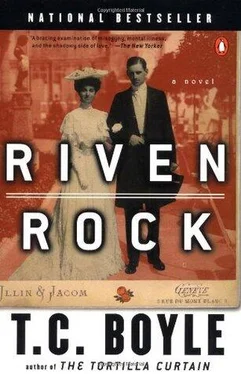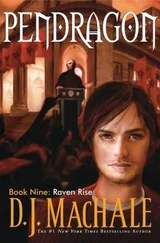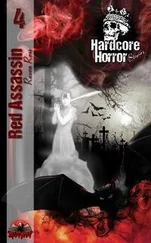T. Boyle - Riven Rock
Здесь есть возможность читать онлайн «T. Boyle - Riven Rock» весь текст электронной книги совершенно бесплатно (целиком полную версию без сокращений). В некоторых случаях можно слушать аудио, скачать через торрент в формате fb2 и присутствует краткое содержание. Год выпуска: 1999, Издательство: Penguin Books, Жанр: Современная проза, на английском языке. Описание произведения, (предисловие) а так же отзывы посетителей доступны на портале библиотеки ЛибКат.
- Название:Riven Rock
- Автор:
- Издательство:Penguin Books
- Жанр:
- Год:1999
- ISBN:нет данных
- Рейтинг книги:5 / 5. Голосов: 1
-
Избранное:Добавить в избранное
- Отзывы:
-
Ваша оценка:
- 100
- 1
- 2
- 3
- 4
- 5
Riven Rock: краткое содержание, описание и аннотация
Предлагаем к чтению аннотацию, описание, краткое содержание или предисловие (зависит от того, что написал сам автор книги «Riven Rock»). Если вы не нашли необходимую информацию о книге — напишите в комментариях, мы постараемся отыскать её.
Riven Rock — читать онлайн бесплатно полную книгу (весь текст) целиком
Ниже представлен текст книги, разбитый по страницам. Система сохранения места последней прочитанной страницы, позволяет с удобством читать онлайн бесплатно книгу «Riven Rock», без необходимости каждый раз заново искать на чём Вы остановились. Поставьте закладку, и сможете в любой момент перейти на страницу, на которой закончили чтение.
Интервал:
Закладка:
What helped him that day, as paradoxical as it may seem, was a flat tire. Flats were as common as rain in those days, when roads were unpaved, tires scarce and garages, mechanics and gasoline stations nonexistent, and every motorist routinely carried a jack and tire iron, an air pump, tire patches and spare inner tubes, in addition to as much surplus fuel and oil as he could find room for. So too Stanley. Usually he would get out and stretch his legs while the chauffeur repaired the tire and remounted the wheel, but on this occasion the chauffeur was back in Medford and the road, as far as he could see in either direction, was empty. And clearly, the car just wasn’t going to go much farther with a punctured tire and blown inner tube.
Stanley climbed down from the car. It was the last day of August, lazy, hot and still, not a breath of breeze, solid white clouds bunched like fists along the horizon. He could smell the grass, acres of it, an infinity of grass, grass and weeds and rank shoddy stands of sumac against a complex of trees so thick and variegated he might have been in the Amazon instead of Massachusetts. Tiger moths floated up out of the roadside weeds, grasshoppers impaled themselves on spears of light, cows looked on stupidly from the fields. Without thinking twice he sloughed off his coat and jacket, peeled back his goggles, and bent to the cool substantial handle of the car jack, and the switch had already shut off, so dead and null and detached from the place inside him where it had been wired it was as if it had never existed, as if he hadn’t raced and trembled and seen a dog staring back at him in the lavatory mirror at the restaurant where he’d tried to eat and couldn’t. All memory of it was gone, vanished, erased. He was a man at the side of a country road, stopped somewhere between a town and a village, changing a tire.
He got his hands black, and the grit of the road worked itself into the knees of his trousers. There were grease smears on his shirt. Sweat dripped from the tip of his nose and puddled in the dust. And he burned, his face reddened till it looked as if he’d been slapped to consciousness, faded, and been slapped again. But he did it. He changed the tire, without help, thanks or advice from anybody, and as he mounted the running board and slipped back behind the wheel, he felt as if he could do anything, brave any danger, as tough and intrepid as Sitka Charley, the Malemute Kid, Jack London himself.
The mood carried him to Beverly, got him down out of the car to ask about local accommodations and purchase fuel at the general store, and it swept him right across that vibrant glowing greensward of a croquet lawn and into the field of Katherine Dexter’s keen sciential vision. He bathed, changed, combed his hair and trimmed his mustache in the mirror, and there he was, reproduced just like anybody else, and he even went so far as to wink at his own image in the glass. And then he went down to dinner, and he’d never been so hungry in his life.
The dining room was lively, full of vacationers bending to their soup and chops amid a subdued clatter of silverware and a crepitating hum of conversation that was soothing and reassuring at the same time, and after standing in the vestibule a moment, Stanley allowed the maître d’ to show him to a table. When the waiter appeared, Stanley thought he might have a glass of wine for the stimulus — he was feeling exhilarated from his feat of driving and the adventure of the tire, and he wanted to prolong the sensation. He gazed out idly over the crowd of diners, the animated faces, the busy elbows, the pleasure everyone seemed to be taking in the smallest things, and he didn’t notice Katherine, not at first, and he was thinking how pleasant it was to be sitting in that dining room way up north of Boston, roving free and with no one to account to, like a knight errant, if knights had automobiles. Then the wine arrived, chilled, in a bucket of ice, and the waiter presented him with the menu.
He began with the ox joints consommé, followed by cucumber spears, olives and the boiled halibut with egg sauce and Parisienne potatoes. He chose the boiled leg of mutton with caper sauce for his meat course, with apple fritters, boiled onions, new green peas and the tomato salad au mayonnaise. For dessert, he began with the bread pudding in cognac sauce, then sampled the Roquefort and Edam cheeses with fruit and biscuit, and he was lingering over his café noir when he happened to glance up and catch the eye of a young woman seated all the way across the room from him in the midst of a gay-looking young group.
Or he didn’t catch her eye, not exactly — she seemed to have caught his. She was staring at him, and she never flinched or turned away when he looked up and saw that she was staring. Normally he wouldn’t have made a thing of it — if anything, he would have shied away and pretended to study the configuration of his cuticles for the next half hour — but he’d never felt so good and the wine was sparkling in his veins and invading his eyes and inhabiting his smile, and there was something about her that was maddeningly familiar, almost as if he knew her…. And after all he’d been through that day, well, he couldn’t help himself. When one of the men in her party got up from the table and crossed the room to the lavatory, Stanley rose inconspicuously and made his way to the lavatory too. Avoiding the mirrors, he watched as the man emerged from one of the stalls and washed up at the sink, and then he cleared his throat, introduced himself and asked if he might not have an introduction to the young lady in blue?
The man was Morris Johnston. He was of average height and build, he dressed in an average way, and his hair and eye color were resolutely average as well — that is, he was neither stout nor thin, not showy but no stick-in-the-mud either, and his coloring was mouse brown. “Oh, you mean Katherine?” he said, not at all taken aback.
“Yes,” Stanley managed, tugging at his collar, which suddenly felt like a garrote round his throat, “Katherine,” and he was trying out the name. “I think I know her. What’s her family name?”
Morris flashed a smile. “Dexter,” he said. “Katherine Dexter. But you’re not from Boston, are you?”
It all came back to him then, from the look of Monsieur LaBonte’s tortured mustaches to the smell of the wax on the polished floorboards of his studio and the feel of that twelve-year-old girl in his arms, all wing and bone and tentative shuffling feet, the girl who was Katherine Dexter, now grown and mature and sitting in the next room, dressed in blue. “No,” he said, remembering the moistness of her palms in that overheated room, the proximity of their bodies, the quality of her laugh on a certain winter day when the temperature plummeted and the snow dropped softly from the sky like the plucked feathers of some rare celestial creature, “I used to know her in Chicago.”
He was shy, Stanley, furtive still, the boy who burrowed, but there was something about Katherine that made him want to open up, turn himself inside out like a glove or a sock, to hide nothing, to spill it all, fears, dreams, hopes, predilections, theories, fixations. They reminisced about Chicago, and when they’d gone round for the second time and remembered everything twice and exhausted the roster of mutual acquaintances and experiences, he saw the light fading in her eyes — she was tired? bored? sated with Monsieur LaBonte and Prairie Avenue and Bumpy Swift? — and he felt a terrible tension rising in him. He had to hold her there, he had to, even if it meant reaching out to touch her wrist where it lay so casually, so nakedly perfect on the table before him, touch it and seize it and pull her to him, though he knew he could never do that, even if he’d sat beside her every night for a thousand years. But if she left him, if she got up from the table, if she danced with Morris Johnston or yawned and put a hand to her mouth and excused herself to turn in for the night or even to use the ladies’ room, he would die. His mouth was full of ashes, his heart was pounding, and even as she leaned toward this other one, this Butler Ames, a whisper on her lips, he felt the voice tighten in his throat and heard himself blurting, “Have you read Debs’s Unionism andSocialism?”
Читать дальшеИнтервал:
Закладка:
Похожие книги на «Riven Rock»
Представляем Вашему вниманию похожие книги на «Riven Rock» списком для выбора. Мы отобрали схожую по названию и смыслу литературу в надежде предоставить читателям больше вариантов отыскать новые, интересные, ещё непрочитанные произведения.
Обсуждение, отзывы о книге «Riven Rock» и просто собственные мнения читателей. Оставьте ваши комментарии, напишите, что Вы думаете о произведении, его смысле или главных героях. Укажите что конкретно понравилось, а что нет, и почему Вы так считаете.












